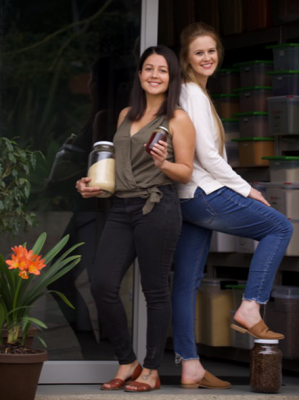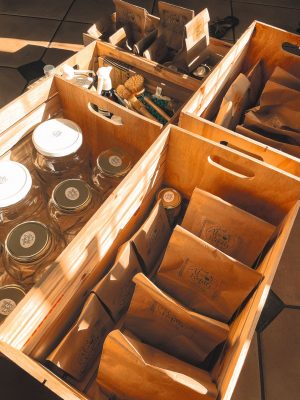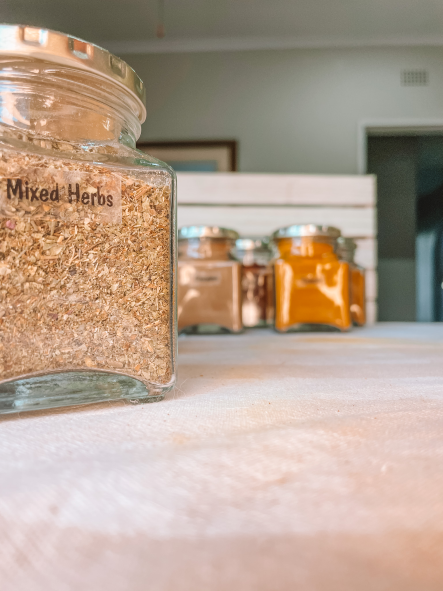The fast-paced world we’re living in often leaves us exhausted, sometimes feeling that we can barely fill our own cup, let alone taking action for the health of the environment.
But we can no longer ignore how quickly our planet is deteriorating. What we need is a convenient and cost-effective solution, which is where Just About Refills (JAR for short) comes in. The heart and soul behind JAR is a team of two Lowveld-based families that were
brought together by their shared mission to find value in nature, to encourage the community, and to live sustainably with purpose.

“Along with our shared love of the outdoors, animals, travel and good coffee!” laughs Jackie Haig. “We’re a small company with big dreams.” Jackie is a dentist by trade, while Andrew has his master’s in wildlife biology and is currently working in the agricultural and conservation fields. Noa Meyer, originally from the States, is a yoga instructor. Her love of conservation fated her to meet Matt at a rhino conservation event in the US. Noa crossed the world for love and she and Matt are now married. He is a safari guide and co-founder of Numinosity, a company that books custom safaris. “Somehow, we manage all that and run JAR with no external help,” says Noa. “Everything, from admin, packing, collection and deliveries, is allocated and split among us.”
While JAR is Mpumalanga-based, it is also a nationwide, plastic-free, zero-waste online eco-store and service, which delivers all your favourite pantry staples and lifestyle goods to your doorstep in jars. “We do rice, nuts, baking goods, spices, oils and even bundles,” says Jackie, adding that you can either use your own jars, or they will deliver in compostable brown bags. You can also order your jars along with your goods. On a mission to tackle more than just food plastic, the store includes eco products for babies, cleaning, feminine hygiene and general lifestyle.

Born from frustration and trouble-shooting on an off-grid weekend away, one simple question started it all: why are “eco-friendly” products all in plastic? The idea took root and they brought their dream to life during lockdown. The idea for a small local shop was ever-present in their minds, but with the uncertainty of the pandemic, an online store was their best chance for success.
The zero-waste movement is a global initiative that drives individual lifestyle changes and habits through daily actions. “Ultimately, our aim is to reduce waste that ends up in a landfill, and develop a sustainable system that is mutually beneficial for the health of our people as well as the conservation of our planet,” explains Noa. “The idea of a zero-waste store is to minimise waste along the supply chain, meaning building a relationship with the suppliers with whom we work. It’s important that they understand and support the concept and ethics our business is built upon.”

Shopping with a zero-waste store like JAR is all about living a fine balance – not taking more than the Earth can provide, so that future generations can also enjoy our beautiful planet. “The majority of our plastic gets repurposed locally. Packaging used for packing and shipping may not be ‘pretty’, as we consciously choose to use recycled boxes and reused, biodegradable materials as void fillers to cushion and protect your products. There are no single-use plastics, and we are committed to reducing waste and environmental impact,” Jackie explains. “We always strive to source products locally and to support small businesses similar to ourselves. This doesn’t always mean going for the cheapest, most convenient option, but rather creating a more sustainable supply chain. We love the local brands that are willing to give us refills, thereby totally eliminating single-use packaging,” adds Noa. “JAR also offers affordable prices, easy access and even a refill station. It is as simple as ordering online, at any time of day, and having your items delivered to your door.”
The JAR team is hoping that local people realise the importance of this way of life. “There is a big misconception that there’s no point to living sustainably. We often think that individually we can’t make a difference, but if we as individuals aren’t part of the tide of change, then who is?”

Plastic pollution is most prominent in developing nations, and for the most part, the African continent does not have effective waste management systems to deal with the plastic waste generated by our current population. The point is to slow the flow of plastic at its source, but also to improve our plastic waste management. There is a lot of positive action; however, the truth is that we all need to do more. Let’s start by shopping plastic-free.
1. Three hundred million tonnes of plastic is produced every year. That is equivalent to the weight of the entire human population. Plastic production has doubled in the last 50 years.
2. Only 9% of all plastic produced is recycled.
3. About 12% has been incinerated.
4. The remaining 79% has accumulated in landfills, dumps or the natural environment.
5. An estimated two million plastic bags are used every minute globally for an average of 12 minutes per bag.
6. It is estimated that a truckload of plastic is dumped into the ocean every minute of every day.
7. The average person eats 70 000 microplastics each year.
Details
www.justaboutrefills.co.za
*Use the code GETIT15 at checkout to get a 15% discount from JAR. Ends July 31.






